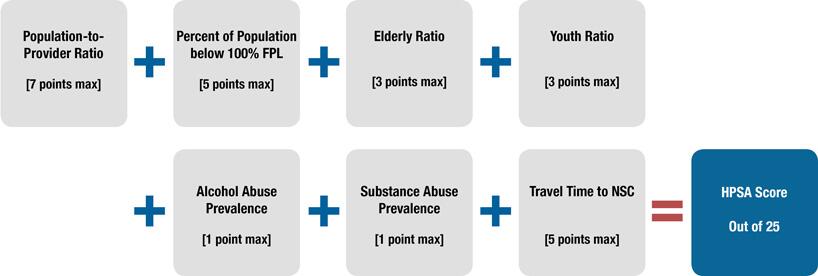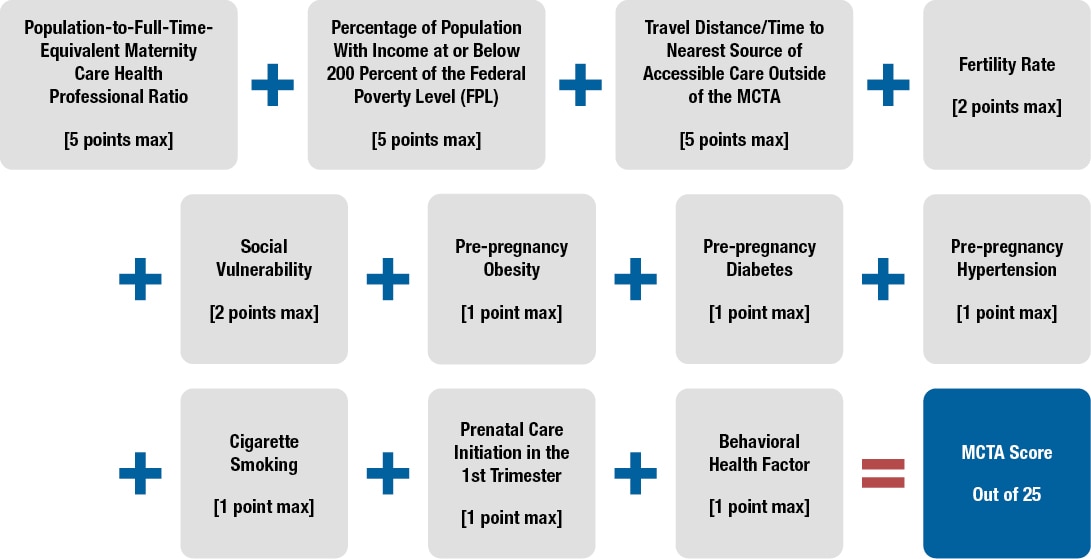The National Health Service Corps (NHSC) statute and regulations governs our rules for designating shortage areas. We receive applications from State Primary Care Offices (PCOs) for shortage designations.
We review the applications. Once we designate an area, we calculate a score.
What Criteria Do We Use for Scoring?
We calculate scores using our online portal, the Shortage Designation Management System (SDMS). It contains standard national data sets.
State PCOs and facilities can provide us with supplemental data.
Health Professional Shortage Areas (HPSAs) and Auto-HPSAs
We calculate HPSA scores based on methodology that includes three disciplines: primary care, dental health, and mental health.
Three scoring criteria are common across all HPSA disciplines:
-
Population-to-provider ratio
-
Percent of population below 100% of the Federal Poverty Level (FPL)
-
Travel time to the nearest source of care (NSC) outside the HPSA designation area
Maternity Care Target Areas (MCTAs)
We calculate MCTA scores based on a separate methodology for areas within existing Primary Care HPSAs.
Three scoring criteria in MCTAs are similar to those used in HPSA disciplines:
- Population-to-Full-Time-Equivalent Maternity Care Health Professional Ratio
- Percentage of Population With Income at or Below 200 Percent of the Federal Poverty Level (FPL)
- Travel Distance/Time to Nearest Source of Accessible Care Outside of the MCTA
How Do We Calculate Scores For HPSAs?
Primary Care HPSA Scoring
Primary Care HPSAs can receive a score between 0-25.
What goes into the score?
- Population-to-Provider Ratio [10 points max]
- Percent of population below 100% Federal Poverty Level (FPL) [5 points max]
- Infant Health Index (based on Infant Mortality Rate (IMR) or Low Birth Weight (LBW) Rate)* [5 points max]
- Travel time to Nearest Source of Care (NSC) outside the HPSA designation area [5 points max]

*The Infant Health Index evaluates both IMR and LBW rate. It awards points based on whichever has the higher score.
Maternity Care Target Areas
Maternity Care Target Areas (MCTAs) are a subset of Primary Care HPSAs. Every NHSC-approved site receives a MCTA score between 0-25. Learn how we score these areas.
Dental Health HPSA Scoring
Dental Health HPSAs can receive a score between 0-26.
What goes into the score?
- Population-to-Provider Ratio [10 points max]
- Percent of population below 100% Federal Poverty Level (FPL) [10 points max]
- Water fluoridation status [1 point max]
- Travel time to Nearest Source of Care (NSC) outside the HPSA designation area [5 points max]

Mental Health HPSA Scoring
Mental health HPSAs can receive a score between 0-25.
What goes into the score?
- Population-to-Provider Ratio [7 points max]
- Percent of population below 100% Federal Poverty Level (FPL) [5 points max]
- Elderly Ratio (percent of people over age 65) [3 points max]
- Youth Ratio (percent of people under age 18) [3 points max]
- Alcohol Abuse Prevalence [1 point max]
- Substance Abuse Prevalence [1 point max]
- Travel time to Nearest Source of Care (NSC) outside the HPSA designation area [5 points max]

Medically Underserved Area and Medically Underserved Population (MUA/P) Scoring
MUA/P scores depend on the Index of Medical Underservice (IMU) calculated for the area or population proposed for designation.
Under the established criteria, an area or population with an IMU of 62.0 or below qualifies for designation as an MUA/P.
An area or population can receive an IMU score between 0-100.
What goes into the score?
-
Provider per 1,000 population ratio [28.7 points max]
-
Percent of population at 100% of the Federal Poverty Level (FPL) [25.1 points max]
-
Percent of population age 65 and over [20.2 points max]
-
Infant Mortality Rate [26 points max]

Exceptional Medically Underserved Populations (MUP) and Governor-Designated Secretary Certified Areas for Rural Health Clinics
We must approve the state-developed criteria for Exceptional MUPs and Governors Designated Secretary Certified Shortage Areas for Rural Health Clinics.
Maternity Care Target Areas (MCTAs) Scoring
Maternity Care Target Areas can receive a score between 0-25. Learn more about MCTAs.
What goes into the score?
- Population-to-Full-Time-Equivalent Maternity Care Health Professional Ratio [5 points max]
- Percentage of Population With Income at or Below 200 Percent of the Federal Poverty Level (FPL) [5 points max]
- Travel Distance/Time to Nearest Source of Accessible Care Outside of the MCTA [5 points max]
- Fertility Rate [2 points max]
- Social Vulnerability [2 points max]
- Maternal Health Indicators
- Pre-Pregnancy Obesity [1 point max]
- Pre-Pregnancy Diabetes [1 point max]
- Pre-Pregnancy Hypertension [1 point max]
- Cigarette Smoking [1 point max]
- Prenatal Care Initiation in the 1st Trimester [1 point max]
- Behavioral Health Factor [1 point max]

How To Contact Us
Shortage Designation Questions
SDMP Questions
Questions about Providers in your Auto-HPSA Update Preview
NHSC or Nurse Corps Questions
Submit a help form or call 1-800-221-9393
CMS Bonus Payment Questions
Contact your Medicare Administrative Contractor (MAC)